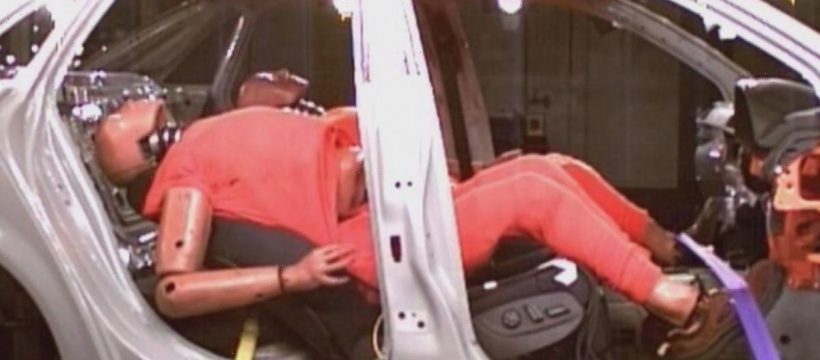Following a series of CBS News reports that revealed potential safety dangers in vehicle seats, Senators Ed Markey and Richard Blumenthal will reintroduce legislation that would require a new strength standard.
“Seatback strength standards have not been substantially updated since 1967, allowing thousands to be injured and killed when their car’s front seats collapse after a crash,” Markey, a Democrat from Massachusetts, told CBS News. “That’s why I’m reintroducing legislation to require the modernization of our seatback safety standards moving forward. We must end these entirely unacceptable and preventable tragedies.”
The Modernizing Seatback Safety Act would require automakers and the National Highway Transportation Administration to strengthen seat standards within two years.
In a series of stories that began airing in 2015, CBS News revealed that when hit from behind, car front seats may break and their occupants can be propelled – forcefully – into the rear seats where children usually sit.
CBS News identified more than 100 people, mostly children, who were severely injured or killed in alleged seatback failures over the past 30 years. The number is likely higher: In 2016, then-NHTSA administrator Mark Rosekind acknowledged that such crashes were not closely tracked.
Crash tests have shown the risks associated with seatback failures for decades, with problems existing in many different car makes and models. Auto safety experts blame a seatback safety standard that dates back to the 1960s.
The cost to fix the problem could be small – as little as on a dollar or so per seat, according to a deposition with an auto company engineer reviewed by CBS News.
“It is the moral obligation of a society to use available, affordable, science-based solutions to limit risks that can kill or severely injure unsuspecting individuals,” said Jason Levine, executive director of the Center for Auto Safety. “The Modernizing Seatback Safety Act can finally bring closure to an embarrassing half-century of an unwillingness to upgrade a safety standard that can be passed with the average dining room chair.”
The bill is written in honor of several families directly affected by seatback failure crashes, including two who previously told their stories to CBS News.
More than a decade after the death of their 16-month old daughter, Taylor, Andy and Liz Warner still struggle with the loss. Taylor was in a car seat behind her father in the family’s minivan when they were rear-ended going 55 miles per hour. Andy’s seat broke and collapsed backwards, killing Taylor.
“Tragically our family is not alone in experiencing this type of unthinkable loss,” said the Warners in a statement. “We are committed to this not happening to another family. Advocating for safety improvements has been a marathon and it is time to get them over the finish line. Our family thanks the senators for their leadership on this issue and urges Congress to pass this legislation without further delay.”
In September 2016, Ben and Kristi Reavis were stopped in traffic with their two kids, 3-year-old Owen and 5-year-old Emily, on a Dallas-area expressway on their way home from church. An SUV slammed into the back of their sedan at 45 mph.
As a crash test simulating the crash and used during a subsequent trial showed, the front seats collapsed, sending Ben and Kristi head first into their own children, who were sitting in car seats in the back seat. Both kids suffered lasting traumatic brain injuries.
“Our children are hurt forever. We just can’t imagine this happening to any other families,” Kristi said in 2018 after a civil jury in Texas awarded the family $242 million.
The measure on seat strength is one of four auto-safety bills Markey and Blumenthal are introducing Monday.
One would offer grants to states to use for notifying registered vehicle owners of safety recalls and establish annual report cards on how effectively automakers are completing open recalls. Another would require automakers to provide more information about incidents involving death or serious injuries and then have NHTSA make that data available to the public in a user-friendly format.
The third would require the Department of Transportation to study how driver-monitoring systems can prevent distraction and misuse of advanced driver assistance systems – including Tesla’s Autopilot – and calls for regulations requiring the installation of driver-monitoring systems based on the agency’s findings.
The Senators hope to include the package in President Biden’s infrastructure bill.
Source: Read Full Article
